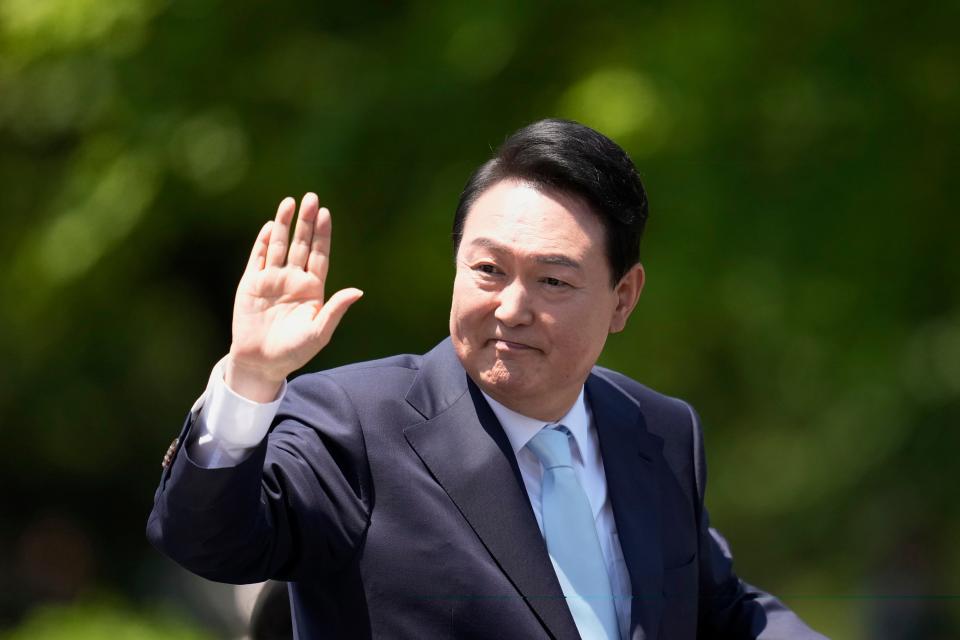Biden tours Samsung plant in South Korea, advocates for legislation to boost chip making
President Joe Biden began his five-day Asia trip with a visit to a Samsung semiconductor plant Friday, a stop meant to demonstrate the growing cooperation between the U.S. and South Korea on technology and other issues.
Biden used the stop to advocate for final passage of a bipartisan bill that the White House says will reduce costs for Americans and help to ease inflation if congressional negotiators can reach a deal. The legislation is intended to boost chip production and guard against future interruptions to the supply chain.
"Over the last few years, we've seen just how critical it is," Biden said after a tour of the Samsung facility with South Korean President Yoon Seok-youl. "The COVID 19 pandemic exposed the fragility of just-in-time supply chains."
Biden said the global semiconductor shortage and Russian President Vladimir Putin's war on Ukraine are contributing to higher prices, and the U.S. would work with close partners like South Korea to strengthen its economy.
Biden's Asia trip: Russia, North Korea, global democracy: Here's what to expect from Biden's first Asia trip

"Putin's brutal and unprovoked war in Ukraine has further spotlighted the need to secure our critical supply chains so that our economy, our economic and our national security are not dependent on countries that don't share our values," Biden said.
When South Korea’s previous president, Moon Jae-in, traveled to Washington last year, the nations announced “mutual and complementary investments” in semiconductors and batteries for electric cars. The intent is to expand production of key products and strengthen supply chains to be less reliant on China.
Legislation is also pending in Congress to bolster U.S. chip production to better compete with China.
The plant that Biden toured is serving as the blueprint for a $17 billion facility the electronics company plans to open near Austin, Texas. That investment will mean good-paying jobs for Americans and increased supply chain resilience, said National Security Adviser Jake Sullivan.
Biden, Sullivan said, will reinforce "that this ecosystem of high technology among democracies and free societies needs to be protected against predation by other countries."
Yoon, in translated remarks before Biden at Samsung's Pyeongtaek plant, said that "semiconductors are naturally security assets for our future" and he looks forward to Biden's support for incentives for Korean semiconductor companies that invest in the U.S.
"I look forward to today's visit translating into U.S.-ROK partnership blossoming into an economic and security alliance based on our partnership for advanced technologies and global supply chains," he said.
RUSSIA, NORTH KOREA, GLOBAL DEMOCRACY: Here's what to expect from Biden's first Asia trip
IN THE WORKS: Senate passes bill to boost US science and tech innovation to compete with China
Biden met Yoon , who was recently elected after promising during his campaign to deepen the nation’s alliance with the United States, at the plant shortly after arriving on Air Force One.
Yoon’s predecessor, Moon, had taken a more cautious approach to the relationship to avoid provoking China.
"I and my country look forward to a very productive few days together where we can get to know one another better and explore ways to take the alliance between Republic of Korea and the United States to even greater heights than it already exists," Biden told Yoon on Friday.
Besides expanding the bilateral alliance with the U.S., Yoon also wants to play a more active role in the Indo-Pacific, where the Biden administration is working to bolster an alliance among democratic countries to counter China’s growing economic and military might.

“South Korea has been described as a missing link in the Indo-Pacific,” said Kuyoun Chung, an assistant professor of political science at Kangwon National University.
China has already signaled its displeasure with Yoon’s interest in joining the Indo-Pacific Economic Framework that Biden is scheduled to roll out during his trip.
The IPEF is the administration’s attempt to help steer economic strategy in the region after former President Donald Trump took the United States out of a trade agreement with Pacific Rim countries. It will focus on trade, strengthening the supply chain, infrastructure and clean energy issues, taxes and anti-corruption efforts.
The inclusion of South Korea, which has the world’s 10th largest economy, into the IPEF would be a significant boost to the administration’s attempt to strengthen security cooperation in the Indo-Pacific, according to Andrew Yeo, an Asia expert at the Brookings Institution.
“By stopping first in Seoul,” Yeo recently wrote, “Biden is recognizing that the Yoon government’s promise to play a larger global role is a major step in that direction.”
'FIGHT FOR SURVIVAL': Senate approves $40 billion in Ukraine assistance as last aid package runs out
US AID TO UKRAINE COULD HIT $53B: Here's what it covers, how it compares and who pays for it
This article originally appeared on USA TODAY: Biden visits Samsung plant in South Korea to reinforce Asia alliance

 Yahoo Movies
Yahoo Movies 